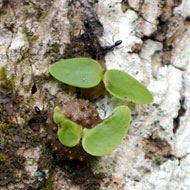
Fijian ants have a unique partnership with plant species
A new study has found ants on the Fiji islands have been 'farming' for at least three million years, long before human agriculture evolved.
Researchers from the University of Munich studied the relationship between the ant species, Philidris nagasau, and members of the plant genus Squamellania. Their findings have been published in the journal Nature Plants.
The ants begin as gardeners, collecting seeds and 'planting' them in fissures in the bark of the host tree, where they germinate. Seedlings form a tiny tuber with a hole - the 'domatium' - through which ants enter to fertilise the seedling with their faeces.
As the ants plant more seedlings they create a 'village' on the supporting tree, with many protected nests. A single ant colony occupies many plants.
Guillaume Chomicki, a PhD student at the university, explained: "One often finds dozens of colonies, connected by ant highways, on a single tree. All of these individuals are the progeny of a single queen, whose nest is located in the centre of the system."
While many ant species live alongside plants to their mutual benefit, this relationship is unique in that both species depend upon each other for survival.
Image © G. Chomicki, LMU



 The Veterinary Medicines Directorate (VMD) is inviting applications from veterinary students to attend a one-week extramural studies (EMS) placement in July 2026.
The Veterinary Medicines Directorate (VMD) is inviting applications from veterinary students to attend a one-week extramural studies (EMS) placement in July 2026.